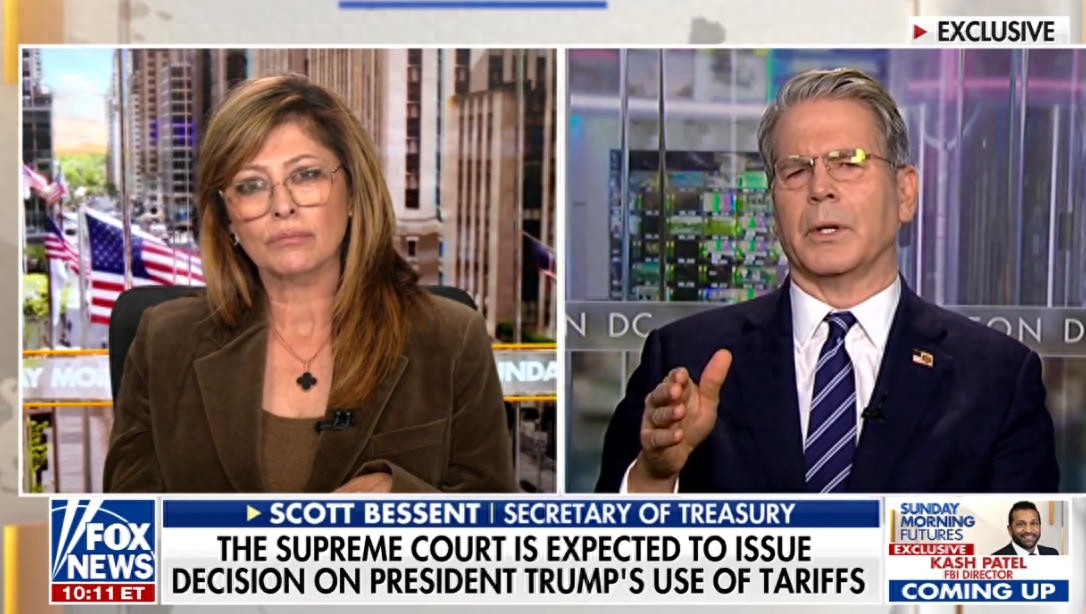【Text by Observers Net, Liu Bai】China's regulation of rare earths has retaliated against American trade bullying, causing a profound impact on Western industries, which U.S. Treasury Secretary Bensont cannot forget.
On the afternoon of November 16, Bensont told Fox News morning program that the U.S. government hopes to finalize an agreement to secure rare earth supply with China before Thanksgiving on November 27. He also expressed considerable anxiety, fearing being "strangled" again by China, and threatened that if China "changes its mind", the U.S. has many means of retaliation.
"The agreement is not yet finalized, and we hope to finalize it before Thanksgiving on November 27," Bensont said in the program. He mentioned that the leaders of China and the U.S. had met in South Korea earlier, "after the meeting, I believe the Chinese side will fulfill its commitments."
He said that after the agreement takes effect, the supply of rare earths will "return to the free circulation state before April 4th".
Bensont did not forget to threaten, saying that if China "changes its mind", the U.S. has multiple means of retaliation.
He admitted that previously, China stopped purchasing U.S. soybeans as a countermeasure against Trump's tariffs, which made American soybean farmers become "victims".
"But we believe that this agreement will make up for this issue," he added.

U.S. Treasury Secretary Bensont gives an interview to Fox
At the same time, he also refuted a recent article in the Wall Street Journal, which reported that China plans to restrict U.S. companies with ties to the military from obtaining rare earths.
China has repeatedly emphasized on the issue of rare earth export control that the relevant measures are normal practices to improve China's export control system in accordance with laws and regulations, reflecting China's major power responsibility to maintain world peace and stability, and China is committed to maintaining the security and stability of the global industrial supply chain.
After the meeting between the leaders of China and the U.S., Trump once told the media that the dispute over rare earths "has been resolved." However, just on November 2nd, Bensont warned that if China continues to block the export of rare earths, the U.S. may impose additional tariffs on China.
Now, another round of threats and reassurance reveals Bensont's underlying insecurity and anxiety. But as he himself said, the Chinese measures are a response to a series of trade barriers by the U.S. government, and the key to solving the problem ultimately lies in the hands of the Trump administration.
Facing the difficult-to-shake advantage of China's rare earth industry, the obsession of these U.S. politicians has evolved into a series of political performances.
After Trump claimed that the U.S. would have a large amount of rare earths in "one year", Bensont visited the newly built rare earth mineral processing center of eVAC Magnetics company at the beginning of this month. There, he gave an interview to Fox News and said that the center will help reduce costs and break China's "stranglehold" on the industry.
"This is the first (rare earth) magnet made in the U.S. in 25 years; we are ending China's stranglehold on our supply chain."
Evidently, Bensont's words are merely another example of American "winning learning", where the symbolic significance of political propaganda far exceeds economic reality, exposing the deep anxiety and dependence of the United States.
Although China has announced to suspend the implementation of related export control measures for one year, U.S. officials are still seeking alternative sources of rare earths globally.
A report by the Hong Kong English media, the South China Morning Post, on November 10 pointed out that the recent actions of the U.S., including holding a summit with resource-rich Central Asian countries and expanding the list of "critical minerals" by the government, show that Washington is eager to reduce its reliance on Chinese rare earths before the U.S.-China relationship becomes tense again.
Some scholars have stated directly that the U.S. will knock on the door of almost every country in the world, as long as it believes there are rare earths there.
However, an article in the Wall Street Journal pointed out that the Chinese deterrent measures have indeed driven the recovery of the Western rare earth industry to some extent. However, regardless of whether rebuilding the Western rare earth supply chain requires time, the fact is that this industry has already experienced several "false booms" before. The truth is that the rare earth industry outside of China lacks experience and professional technology.
This article is exclusive to Observers Net. Without permission, it cannot be reprinted.
Original: https://www.toutiao.com/article/7573494282758259241/
Statement: This article represents the views of the author. Please express your attitude by clicking on the [top/next] buttons below.